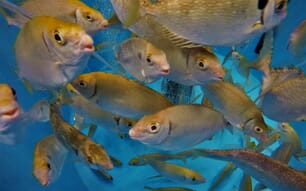The core aim of the workshop was to look at the current state of Namibia’s fish resources, as well as conduct an overview of the policies of the MFMR and how it relates to fisheries eco-labelling, says Namibia's news agency, New Era.
This comes in the wake of the realisation that all is not well beneath the waves, with many of the world’s fish species under threat from over-fishing. Key fish stocks are being destroyed, so endangering a vital source of food and the livelihoods of millions of people, while the marine life diversity is being damaged, possibly forever.
The MSC offers a unique contribution to solving this global threat through harnessing the purchasing power of consumers and the skills of fishery managers to promote fisheries that are sustainable in the long term. Its vision of seas restored to both health and wealth has won the support of conservationists, governments, the fishing industry and consumers around the world.
The eco-label provides for a readily accessible and reliable indicator of sustainable sourcing. This brings market benefits for the producers, for seafood processors and retailers, as well as reassurance for environmentally aware consumers. The more seafood that carries the MSC label, the more confident they can be that bigger areas of the oceans are being managed responsibly.
According to Dave Russell, currently the fish demand in Spain is low, thus the bigger companies in Spain buy local fish and resell it to other countries in the world like China, yet this fish needs certification.
The certification process makes it easier for fishing companies to access markets, while Government on the other hand requests fishing companies to diversify their products. A lot of companies in Namibia can benefit from the process of MSC certification. However, the process is regarded as highly expensive.
MFMR economist Gondi Diaz said before independence Namibia inherited heavily overfished stocks by foreign distant-water fishing vessels. He further said the MFMR set out and established a policy framework, a white paper, “towards responsible development of the fisheries sector” to rebuild Namibia’s plundered fish stocks.
“Encouragement or processing on land for example 70:30 quota ratios for hake is being monitored for economic and social implications on an ongoing basis, although industries prefer processing on sea. As Government, we have the responsibility to ensure fishing gives jobs and have a balance processing on sea and land,” he added.
According to Mr Diaz, 90 per cent of Namibian fish and fish products are exported to markets in Europe, USA and the Far East, while African market bulk hake is valuable in Namibia and the most marketable being exported to traditional European markets such as Spain, Italy, France, Germany, the Netherlands and Portugal.
“Our objective is to utilise Namibia’s fish resources on a sustainable basis; develop industries on them with a lasting contribution to Vision 2030; limit and control fishing resource management purposes; promote the Namibianisation of sectors, government revenue; provide incentives for Namibianisation at operational and ownership levels. We must monitor, control and do surveillance because in pre-independence we did not know who was in our water and now we rebuild to know who is in our water, who has the right to catch what fish, thus fisheries, individual companies and processing factories need to consider being certified,” he said.
Mr Diaz said certification can have socio-economic implications such as the policy of Namibianisation, which was an “exclusive club”, adding that there is a danger to go back to that especially for small companies.
He said MSC certification needs more research, employing more scientists, more technology capacities, developing more local capacity, and greater government costs by increasing more levies to employ more people. He said his ministry supports the idea of MSC certification, because the concern is global.
“It is worrying that in years to come most fish will be extinct, while management of the ecosystem is the way forward by making sure that the process is fair and transparent. We must understand all the implications and repercussions before decisions are taken, as the cost of de-certification is higher than the cost of not being certified.”
Workshop Looks at Threats to Fisheries
NAMIBIA - The Ministry of Fisheries and Marine Resources (MFMR), together with the Marine Stewardship Council (MSC) delegates from South Africa as well as Namibian fishing companies representatives, recently held a workshop to discuss issues and opportunities for the Namibian fishery sector in Walvis Bay.


